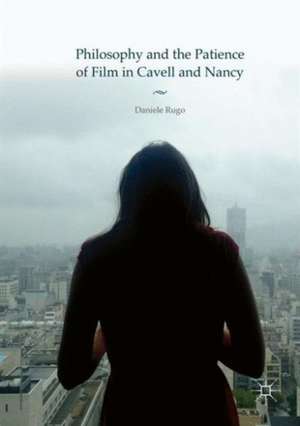Philosophy and the Patience of Film in Cavell and Nancy
Autor Daniele Rugoen Limba Engleză Hardback – 12 apr 2016
Through detailed readings of cinematic works ranging from Hollywood classics to contemporary Iranian cinema, this book describes the interaction between film and philosophy as a productive friction from which the concept of patience emerges as a demand for thinking.
Daniele Rugo explains how Nancy and Cavell's relationship with film demands the surrendering of philosophical mastery, and that it is precisely this act in view of the world that brings Cavell and Nancy to the study of film. While clarifying the nature of their engagement with film this book suggests that film does not represent the world, but 'realizes' it. Thisrealization provides a scene of instruction for philosophy.
Preț: 333.08 lei
Nou
Puncte Express: 500
Preț estimativ în valută:
63.73€ • 66.55$ • 52.63£
63.73€ • 66.55$ • 52.63£
Carte tipărită la comandă
Livrare economică 11-17 aprilie
Preluare comenzi: 021 569.72.76
Specificații
ISBN-13: 9781137580597
ISBN-10: 1137580593
Pagini: 196
Ilustrații: XX, 196 p.
Dimensiuni: 148 x 210 x 18 mm
Greutate: 0.39 kg
Ediția:1st ed. 2016
Editura: Palgrave Macmillan UK
Colecția Palgrave Macmillan
Locul publicării:London, United Kingdom
ISBN-10: 1137580593
Pagini: 196
Ilustrații: XX, 196 p.
Dimensiuni: 148 x 210 x 18 mm
Greutate: 0.39 kg
Ediția:1st ed. 2016
Editura: Palgrave Macmillan UK
Colecția Palgrave Macmillan
Locul publicării:London, United Kingdom
Cuprins
Acknowledgments
Abbreviations
General Introduction
Chapter 1: Taking things to heart
Chapter 2: Cavell and the conditions of the world
Chapter 3: Nancy and the world without sense
Chapter 4: The World Realized
Chapter 5: The Patience of Film
Notes
Bibliography
Index
Abbreviations
General Introduction
Chapter 1: Taking things to heart
Chapter 2: Cavell and the conditions of the world
Chapter 3: Nancy and the world without sense
Chapter 4: The World Realized
Chapter 5: The Patience of Film
Notes
Bibliography
Index
Recenzii
“The book … leaves the reader with a taste for reflection’s pleasures, for what it can do when it does not run amok. It is a reminder that thought, too, might help show how different different things are.” (Kathleen Kelley, Graduate Faculty Philosophy Journal, Vol. 39 (2), 2019)
“The book is an excellent overview of the mutual concerns of Stanley Cavell and Jean-Luc Nancy … . The Patience of Film will be most useful to philosophers and film scholars looking for new connections between continental and analytic or postanalytic traditions, since the book’s primary contribution is the way that it brings Nancy and Cavell together through detailed readings of their work.” (Chelsea Birks, Symposium, c-scp.org, August, 2018)
Notă biografică
Daniele Rugo is Lecturer in the Department of Social Sciences, Media & Communications at Brunel University, London. He is the author of Jean-Luc Nancy and the Thinking of Otherness (2013). His articles have appeared in Angelaki, Continental Philosophy Review, Film-Philosophy and Studies in European Cinema.
Textul de pe ultima copertă
Philosophy and the Patience of Film presents a comparative study of the work of Jean-Luc Nancy and Stanley Cavell. It discusses the effect of their philosophical engagement with film, and proposes that the interaction between philosophy and film produces a power of patience capable of turning our negation of the world into a relation with it.
Through detailed readings of cinematic works ranging from Hollywood classics to contemporary Iranian cinema, this book describes the interaction between film and philosophy as a productive friction from which the concept of patience emerges as a demand for thinking.
Daniele Rugo explains how Nancy and Cavell's relationship with film demands the surrendering of philosophical mastery, and that it is precisely this act in view of the world that brings Cavell and Nancy to the study of film. While clarifying the nature of their engagement with film this book suggests that film does not represent the world, but 'realizes' it. Thisrealization provides a scene of instruction for philosophy.
Through detailed readings of cinematic works ranging from Hollywood classics to contemporary Iranian cinema, this book describes the interaction between film and philosophy as a productive friction from which the concept of patience emerges as a demand for thinking.
Daniele Rugo explains how Nancy and Cavell's relationship with film demands the surrendering of philosophical mastery, and that it is precisely this act in view of the world that brings Cavell and Nancy to the study of film. While clarifying the nature of their engagement with film this book suggests that film does not represent the world, but 'realizes' it. Thisrealization provides a scene of instruction for philosophy.
